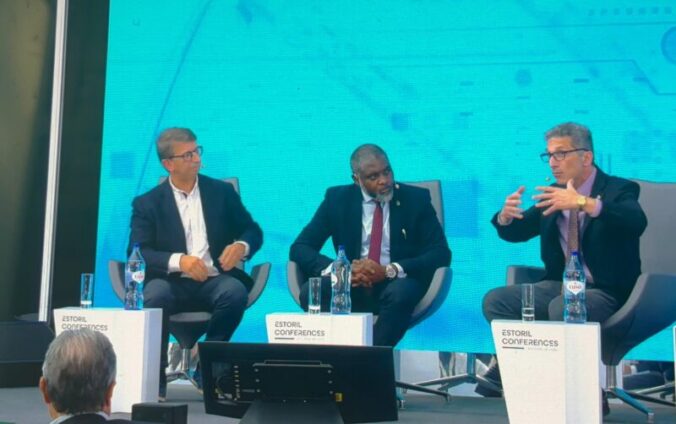Global health experts have highlighted the need for clinical research that better represents populations worldwide.
Dr John Amuasi, Executive Director of the African Research Network for Neglected Tropical Diseases (ARNTD) and Co-Lead of the Lancet One Health Commission, and Prof. Andre Kalil, from the University of Nebraska Medical Center’s Infectious Diseases Division, believe in making clinical trials more inclusive for populations which are often underrepresented in global health research.
This discussion was one of the many striking conversations at the Estoril Conferences – A Future of Hope 2024 in Portugal.
This year’s conference, themed “Time to ReThink,” brought together experts to address critical issues in health, technology, policy, and sustainability, promoting innovative solutions for the world’s most pressing challenges.
Clinical research today is moving beyond the stereotypical image of lab-based studies to a broader, community-oriented approach.
This change requires engaging with people directly in their environments, whether in urban hospitals or rural villages, to gain meaningful insights and trust.
Dr. John Amuasi describes this as “an art,” emphasizing the complexity required in the field.
“Sometimes it means going into people’s homes and saying, ‘Please, can I have some blood for this study?’” he explained. “It’s about understanding and connecting.”
Ethics of Inclusive Clinical Trials
An often overlooked aspect of clinical research ethics is the need for equitable access not only to treatments and vaccines but also to participation in trials themselves.
Prof. Andre Kalil, from the University of Nebraska Medical Center’s Infectious Diseases Division, highlights the critical gaps in representation, saying, “There is no excuse—not in any way, shape, or form—to not have randomized controlled trials done in every part of the globe. The lack of access to these trials is one of the biggest inequities we face today. It is unjustifiable.”
Dr. Amuasi, advocated for the involvement of low and middle-income countries (LMIC) in clinical trials to ensure that treatments are relevant and effective for diverse populations.
“The lack of diversity in clinical trials often skews data, potentially limiting the efficacy of treatments for underrepresented communities,” he said.
A Step Toward Equitable Clinical Trials
To address these inequities, the World Health Organisation (WHO) recently introduced guidelines aimed at making clinical trials more accessible and inclusive.
It addressed the logistical and financial challenges of conducting trials in remote regions while maintaining rigorous standards for safety and efficacy.
“These guidelines are a step in the right direction,” Dr. Amuasi states, “but they must be backed by proper financing and a commitment to doing things differently.”
Reflecting on the evolution of HIV treatment, he points out, “What was once an expensive, unaffordable treatment is now accessible to nearly everyone. We know how to do this, and we have the resources. It’s just a matter of directing those resources effectively.”
Prof. Kalil urged local governments to collaborate with pharmaceutical companies on clinical trials to ensure investigational products whether drugs or vaccines are accessible to the population at subsidized prices.
He emphasized that these partnerships should be established before the trials commence.
Clinical Research future
For both Dr. Amuasi and Prof. Kalil, the future of clinical research lies in a commitment to inclusion, ethics, and global representation. Expanding clinical trial access in LMICs is not only a logistical challenge but an ethical imperative.
“If drug companies are developing products for the world, then their trials must include people of the world,” Dr. Amuasi emphasizes.
“These questions must be asked from the ground up, and when that happens, companies will listen. Then we can make better decisions, have better information, and care for our patients in a way that’s truly reflective of the world.”
Latest Stories
-
Ghana ranked 7th globally as biggest beneficiary of World Bank funding
3 mins -
IMF board to disburse $360m to Ghana in December after third review
7 mins -
Former Bono Regional NPP organiser donates 13 motorbikes to 12 constituencies
13 mins -
Securities industry: Assets under management estimated at GH¢81.7bn in quarter 3, 2024
18 mins -
Gold Fields Ghana Foundation challenges graduates to maximise benefits of community apprenticeship programme
2 hours -
GBC accuses Deputy Information Minister Sylvester Tetteh of demolishing its bungalow illegally
2 hours -
Boost for education as government commissions 80 projects
2 hours -
NAPO commissions library to honour Atta-Mills’ memory
2 hours -
OmniBSIC Bank champions health and wellness with thriving community walk
2 hours -
Kora Wearables unveils Neo: The Ultimate Smartwatch for Ghana’s tech-savvy and health-conscious users
2 hours -
NDC supports Dampare’s ‘no guns at polling stations’ directive
3 hours -
Police officer interdicted after video of assault goes viral
3 hours -
KNUST’s Prof. Reginald Annan named first African recipient of World Cancer Research Fund
3 hours -
George Twum-Barimah-Adu pledges inclusive cabinet with Minority and Majority leaders
4 hours -
Labourer jailed 5 years for inflicting cutlass wounds on businessman
4 hours

